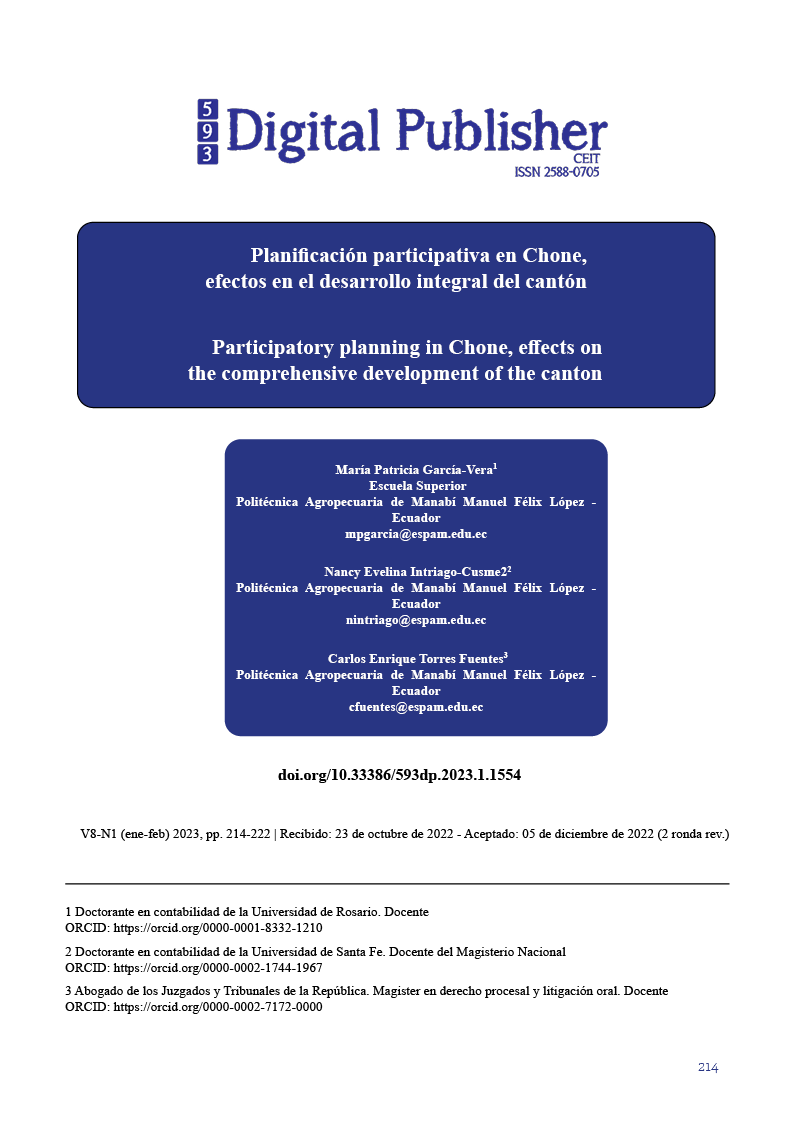Participatory planning in Chone, effects on the comprehensive development of the canton
Main Article Content
Abstract
Participatory planning, constitutionally established in Ecuador, to manage local development from the active participation of the citizen, is the key to strengthening the competencies, especially of decentralized autonomous governments, and is an opportunity to promote citizen empowerment and awareness of their own needs and possible solutions to them, integrating them into the decision-making of local governments. The objective of this research is to analyze the development of participatory planning and its effects on the integral development of the canton of Chone, with a quantitative and qualitative-descriptive approach, through documentary and field analysis of the study variables and the contrast of the results with the budget execution of the Gouvernement Municipal of Chone. It is concluded that, in the Organic Plan for Territorial Development, citizen participation with the representativeness of the neighborhoods and communities of Chone, was not adequate, the planned projects and programs were overestimated concerning the economic reality of the institution, which once evaluated do not reflect significant progress at the general level, which ultimately affected local development with the participation of the community.
Downloads
Article Details

This work is licensed under a Creative Commons Attribution-NonCommercial-ShareAlike 4.0 International License.
1. Derechos de autor
Las obras que se publican en 593 Digital Publisher CEIT están sujetas a los siguientes términos:
1.1. 593 Digital Publisher CEIT, conserva los derechos patrimoniales (copyright) de las obras publicadas, favorece y permite la reutilización de las mismas bajo la licencia Licencia Creative Commons 4.0 de Reconocimiento-NoComercial-CompartirIgual 4.0, por lo cual se pueden copiar, usar, difundir, transmitir y exponer públicamente, siempre que:
1.1.a. Se cite la autoría y fuente original de su publicación (revista, editorial, URL).
1.1.b. No se usen para fines comerciales u onerosos.
1.1.c. Se mencione la existencia y especificaciones de esta licencia de uso.
References
Asamblea Constituyente. (2008). Constitución Política del Ecuador. Registro Oficial 449. https://www.defensa.gob.ec/wp-content/uploads/downloads/2021/02/Constitucion-de-la-Republica-del-Ecuador_act_ene-2021.pdf
Asamblea Nacional del Ecuador. (2010, 22 de octubre). Código Orgánico de Planificación y Finanzas Públicas. Registro Oficial Suplemento 306. https://ces.gob.ec/lotaip/2020/Julio/Literal_a2/C%C3%B3digo%20Org%C3%A1nico%20de%20Planificaci%C3%B3n%20y%20Finanzas%20P%C3%BAblicas.pdf
Gobierno Autónomo Descentralizado Municipal del cantón Chone. (2020). Actualización del Plan de Desarrollo y Ordenamiento Territorial del cantón Chone 2019-2023. https://www.chone.gob.ec/documentos/documpub1647014149.pdf
Cordero, J. (2018). El gobierno municipal ¿Promotor del desarrollo local? El caso del municipio semiurbano de Cd. Ixtepec, Oaxaca. Revista de Alimentación Contemporánea y Desarrollo Regional. 52 (28), 2-29. DOI: http://dx.doi.org/10.24836/es.v28i52.575
Córdoba, M. Vivanco, L. (2021). El sistema de planificación cantonal del Ecuador: la necesidad de su reforma. Íconos. Revista de Ciencias Sociales, (69), 163-179. https://doi.org/10.17141/iconos.69.2021.4261
Guanoluiza, M. (2022). La planificación participativa en la gestión del territorio: el caso de la parroquia Malchingui en Ecuador. Boletín de Coyuntura. 32(1). 25-35. https://dialnet.unirioja.es/servlet/articulo?codigo=8489025
Hernández, R. Fernández, C. Baptista M. (2014). Metodología de la Investigación, Editorial McGraw-Hill. Sexta edición. ISBN: 978-1-4562-2396-0
Márquez, L. Vasallo, Y. Cuétara, L. Sablón, N. (2019). Sistema de indicadores para la sostenibilidad en las comunidades rurales del Ecuador en el marco de la Agenda 21 Local. Espacios. 40 (18). 1-28. https://www.revistaespacios.com/a19v40n18/19401828.html
Merino, M. (2019). La participación ciudadana en la democracia. Editorial del Instituto Nacional Electoral. Segunda edición. ISBN 978-607-8711-50-5
Mora, M. Martínez, F. (2018) Desarrollo local sostenible, responsabilidad social corporativa y emprendimiento social. Equidad Desarrollo. (31, suplemento). 27-46. doi: http://dx.doi.org/10.19052/ed.4375
Morillo, J. Huachallanqui, J. Palacios, J. Uribe, Y. (2020). Gobernabilidad y participación ciudadana en el desarrollo local de Lima. Venezolana de Gerencia. 25(92). 1313-1325. https://www.redalyc.org/journal/290/29065286003/html/
Ramos, C. (2020). Los Alcances de una Investigación. CieniAmérica. 9 (3), 1-6. http://dx.doi.org/10.33210/ca.v9i3.336
Sánchez, M. (1984). Elementos de participación ciudadana. Estudios de Administración Local y Autonómica. 221. 38-46. https://www.researchgate.net/publication/317193696_ELEMENTOS_DE_LA_PARTICIPACION_CIUDADANA
Sánchez, A. Martín, M. Alonso, I. Sánchez, N. (2018). Retoso del desarrollo local en Cuba. Estudio de caso en el municipio Contramaestre. Revista Cubana de Antropología Sociocultural. 11(13). 89-114. http://www.revista-batey.com/index.php/batey/article/view/226/152
Sandoval, C. Sanhueza, A. Williner, A. (2015). La planificación participativa para lograr un cambio estructural con igualdad. Las estrategias de participación ciudadana en los procesos de planificación multiescalar. (Manuales de la CEPAL). Comisión Económica para América Latina y el Caribe. https://repositorio.cepal.org/bitstream/handle/11362/39055/7/S1501278_es.pdf
Servicio Nacional de Compras Públicas. 2022. Procesos de contratación. www.sercop.gob.ec
Sosa, M. Riquelme, Y. Diez, O. (2020). Consideraciones sobre el desarrollo local. Universidad y Sociedad. 12(4). 309-315. http://scielo.sld.cu/pdf/rus/v12n4/2218-3620-rus-12-04-309.pdf




